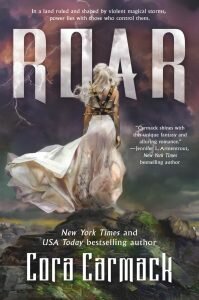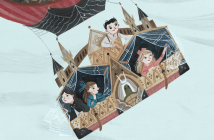 When I set out to write Roar, I tried to let the storms inform every part of my worldbuilding. I thought about how they would affect daily life, employment, government, society, etc. So when I first started delving into the city and it’s societal norms, it was obvious to me that the main class division would be about safety in a dangerous world.
When I set out to write Roar, I tried to let the storms inform every part of my worldbuilding. I thought about how they would affect daily life, employment, government, society, etc. So when I first started delving into the city and it’s societal norms, it was obvious to me that the main class division would be about safety in a dangerous world.
Those in the royal family or connected to it live the safest lives. Anyone connected to the palace would also live a relatively safe existence — soldiers, officials, advisors. Then you’d have those who worked menial jobs in the palace, who were provided safety by coincidence. Low-level jobs in the palace would likely be very competitive. And if you made the slightest mistake, there were likely hundreds waiting in the wings to take your job. And of course, below that you have the citizens who live in the city, but outside the palace. They’re still protected by the Stormling leader, but in slightly more danger from unexpected storms. And the lowest rung of society in Caelira is made up of those who don’t hold citizenship in a Stormling city. Those people are left to fend for themselves in the wildlands, where storms reign supreme and no one is there to protect you but yourself.
While I conceptualized society in terms of safety, obviously things like money and food and employment would all naturally follow the same lines of division. And not unlike our own world, that system would reinforce itself through time. Those who lived in the safety of the palace would continue to grow their wealth, grow their power and influence. Those working low-level jobs would have very little chance for advancement because there would be tremendous competition for few spaces, and they’d be working so hard just to get by that advancement would seem near impossible. In the book, Novaya — a maid attempting to work her way up in the order of things by apprenticing for the Royal seamstress — reveals to the main character Aurora that people like her live essentially on a blade’s edge all the time. They live in fear of a making a mistake that will get them replaced, and that fear also forces them to settle for lower pay or poorer circumstances. And they can’t argue or stand up for themselves because they’re so easily replaced. And at least they’re protected working in the palace.
It was really important for me that Aurora and Novaya’s friendship be genuine and honest, so that meant popping Aurora’s little privileged bubble. She and Nova might live in the same palace, but they lead drastically different lives, and see the world through drastically different eyes. So during one particular scene, Nova makes an incredibly brave move and she tells Princess Aurora exactly what she thinks. She tells her about the unfair aspects of their kingdom, and gives her just a glimpse of what it’s like to worry for her safety constantly. Such free speech could easily mean losing her job or worse, but she makes that stand. Aurora, like most sheltered royalty I would think, is largely ignorant to everything Nova tells her. But she listens. She listens, and observes her world, and starts to see various injustices for herself.
It’s that kind of process that I really wanted to accomplish with their friendship. We all know that reading teaches empathy, and I really wanted that to play out on the page. Aurora has lived an extremely sheltered life, and for much of it books were her only company. But those books taught her how to put herself in someone else’s shoes. So when Nova talks about her life, Aurora just listens. And I think that’s an important skill for all of us to learn. When women and girls talk about their experiences, men need to listen. Just listen. When POC talk about their experiences, white people (and other POC) need to listen. When LGBTQIA people share their struggles, LISTEN. And when it’s your turn, be brave enough to speak.



